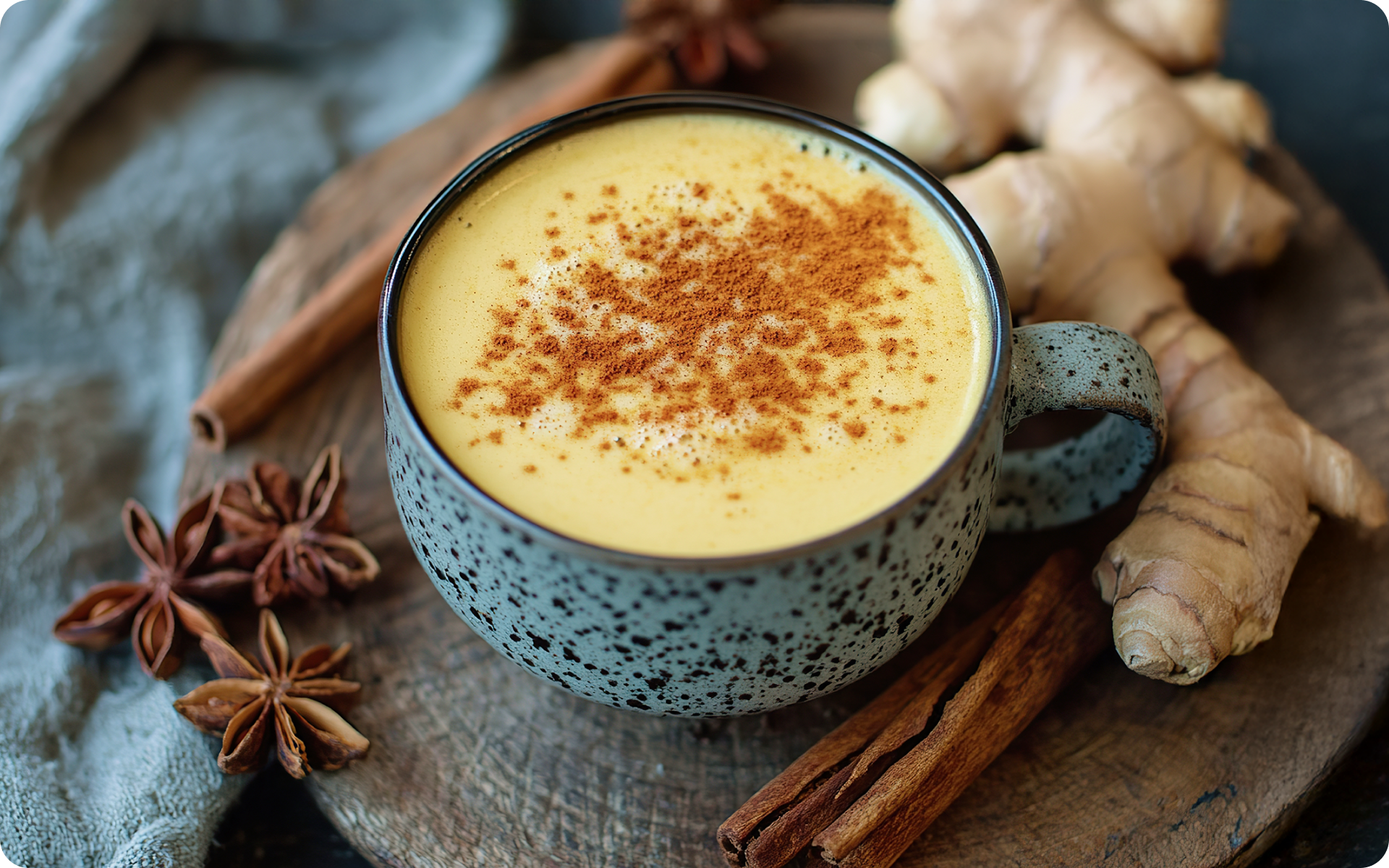Turmeric and cinnamon are believed to be two of the most powerful spices on the planet. When they’re combined, they make a potent elixir that has been used for centuries in Ayurvedic medicine for treating a wide variety of ailments.
Golden milk is made by simmering dairy or non-dairy milk with turmeric, cinnamon, ginger, and other spices. The resulting drink is a rich, creamy, and anti-inflammatory powerhouse that’s perfect for sipping on at any time of day.
Are you curious about what happens when these two spices team up? Keep reading to learn all about the possible benefits of golden milk and how to make your own at home.
What’s In Turmeric and Cinnamon Tea?
Turmeric and cinnamon tea is a concoction of two potent spices, turmeric and cinnamon, steeped in hot water or milk. These warm and earthy flavors complement each other perfectly, creating a comforting blend that is both soothing and invigorating.
Turmeric, a root that’s a member of the ginger family, is known for giving curry its yellow color and is a staple of traditional Indian cuisine. It’s revered for its active compound, curcumin, which is a potent antioxidant and anti-inflammatory substance (14).
When combined with black pepper, curcumin’s bioavailability is enhanced, which means the body can absorb and utilize it more effectively.
Cinnamon, derived from the inner bark of the Cinnamomum tree, is another nutritional dynamo. It’s rich in antioxidants and has been linked with a range of health benefits, including lowering blood sugar levels and reducing heart disease risk factors (6).
When combined, turmeric and cinnamon create a tea that’s tasty and also contains trace amounts of essential nutrients, including calcium, iron, magnesium, fiber, vitamin B6, and potassium.
Some turmeric and cinnamon tea recipes also contain the following spices that serve important functions:
- Black pepper – our bodies can’t utilize curcumin (the active ingredient in turmeric) as efficiently on its own. Black pepper contains an active ingredient called piperine that helps increase the bioavailability of curcumin (18).
- Coconut oil – curcumin is fat-soluble, which means it’s best absorbed by our bodies when consumed with fat. Coconut oil is a source of fat that helps increase the absorption of curcumin and pairs well with the other flavors in golden milk (16).
- Ginger – ginger is a warming spice with powerful anti-inflammatory and nausea-reducing properties. It’s the perfect addition to this recipe if you’re looking to soothe an upset stomach (15).
To make golden milk, you’ll need (17):
- 1 ½ cups whole milk
- 1 (1-inch) piece fresh turmeric, peeled and finely grated or minced – approximately 1 ½ teaspoons
- 1 (1-inch) piece fresh ginger, peeled, and finely grated or minced – approximately 1 teaspoon
- ½ teaspoon pure vanilla extract
- 3 to 4 whole black peppercorns
- ¼ teaspoon ground cinnamon, plus more for garnish
- 1 pinch cardamom, optional
- 1 to 2 teaspoons raw honey, to taste, optional
Instructions:
- Add all ingredients apart from the honey or maple syrup to a small saucepan.
- Bring the mixture to a simmer over medium heat, stirring occasionally.
- Once the mixture has reached a simmer, reduce the heat to low and allow it to simmer for 10 minutes.
- Remove the pan from the heat and strain the liquid (if you’re using fresh ginger and turmeric, this step is not optional).
- Add honey or maple syrup to taste.
- Serve immediately
Dropping pounds by the dozens without putting yourself through the wringer is everyone’s weight loss pipe dream. But what if we told you that the BetterMe app can make that happen? Keep yourself in prime shape with our fat-blasting workouts, delicious budget-sparing recipes, and body-transforming challenges with our app!
Benefits of Turmeric and Cinnamon
Turmeric and cinnamon tea is a delicious and easy way to incorporate these two powerful spices into your diet. When it’s consumed regularly, this tea is believed to offer a wide variety of health benefits.
It should be noted that most research on the health benefits of cinnamon uses the extract, which is a potent source of the active compounds.
Most powders you’ll find in the spice aisle at your grocery store aren’t as concentrated as a quality cinnamon extract. You can get cinnamon extract in capsules or liquid form at most health food stores.
1. May Reduce Inflammation
Inflammation is a natural response from the immune system that helps you heal from injury or infection. However, when inflammation becomes chronic, it is linked with a variety of health problems such as obesity, heart disease, and cancer (5).
Turmeric and cinnamon are both potent anti-inflammatories that may help reduce chronic inflammation (7) (24).
Studies have shown that curcumin (the active ingredient in turmeric), gingerol (the active ingredient in ginger), and cinnamaldehyde (the active ingredient in cinnamon) all have anti-inflammatory properties (4).
2. May Boost Cognitive Function
Turmeric and cinnamon tea may also help improve cognitive function. Curcumin has been shown to improve working memory and mood in healthy older adults by at least one randomized controlled trial (19).
Cinnamon has also been shown to improve cognitive function by improving memory and learning. It also has neuroprotective effects as it helps prevent cognitive impairment (8).
3. May Improve Digestive Health
The anti-inflammatory properties of turmeric and cinnamon tea are believed to encourage a healthy gut microbiome that’s essential for digestion.
Turmeric has traditionally been used for treating various digestive ailments, including dyspepsia, abdominal pain, familial adenomatous polyposis, inflammatory bowel disease, and colon cancer (24).
In addition, cinnamon extract is said to reduce the symptoms of irritable bowel syndrome (IBS) (3).
4. May Protect Against Infection
Turmeric and cinnamon tea may also help protect against or fight infection. Based on test tube studies, curcumin may have antimicrobial activity against specific pathogens (13).
In addition, cinnamaldehyde extract has been found to reduce the growth of Candida albicans, a type of yeast that can cause infections, although it doesn’t perform as well as antifungal drugs (22).
5. May Lower Blood Sugar Levels
Turmeric and cinnamon tea may also help lower blood sugar levels. Ginger has been found to increase insulin sensitivity, which helps our bodies better regulate blood sugar levels (15).
Cinnamon has also been shown to lower blood sugar levels by increasing the uptake of glucose into cells and stimulating cellular glucose metabolism, at least in test tube and animal studies (10).
Read more: Cumin vs Turmeric: What’s the Difference?
6. May Prevent Cell Damage
Turmeric and cinnamon tea may also help prevent cell damage. Curcumin possesses antioxidant properties, which means that it can potentially protect cells from damage caused by oxidative stress (2).
Compounds isolated from cinnamon have also been found (in a test tube) to reduce the formation of advanced glycation end products (AGEs), a type of molecule that contributes to cell damage (6).
7. May Improve Mood
People who regularly consume turmeric and cinnamon tea often report feeling more energetic and happy. This may be due to the fact that curcumin may increase levels of serotonin and dopamine, two neurotransmitters that are known to regulate mood.
Circumin has been found to exhibit antidepressant action in animal models of depression (1).
8. May Reduce Risk of Cancer
Turmeric and cinnamon tea may also help reduce the risk of cancer. Its rich antioxidant and anti-inflammatory properties may help protect cells from damage and prevent the formation of cancerous tumors (9) (24). Human studies are limited, but test-tube and animal studies have shown promising results.
Are There Any Side Effects of Drinking Turmeric Cinnamon Tea?
Turmeric and cinnamon are both generally safe spices with few side effects. However, some people may experience gastrointestinal upset, such as bloating or gas. If you experience these symptoms, it’s best to discontinue your use of the spices.
It should be noted that not all cinnamon is the same, and the form you use may make a difference in terms of its health benefits.
Cassia cinnamon, which is also known as Chinese cinnamon, is the most common type of cinnamon that is sold in the United States. It’s what you’ll find in most supermarkets and it is identifiable from its dark reddish-brown color and spicy taste.
Cassia cinnamon contains high levels of coumarin, a compound that can be toxic when consumed in large amounts.
According to the European Food Safe Authority, cassia cinnamon can cause liver damage if it is consumed in large quantities. It’s also a carcinogen, which means it can potentially cause cancer (23).
Don’t worry about normal day-to-day use to flavor foods and beverages, but you may want to avoid consuming excessive amounts of cassia cinnamon.
At the same time, Ceylon cinnamon, which is also known as “true” cinnamon, is native to Sri Lanka. It’s lighter in color and has a milder, sweeter flavor than cassia cinnamon.
Ceylon cinnamon contains far lower levels of coumarin, which makes it a safer choice if you’re looking to get the health benefits of cinnamon (12).
Our Cumin vs Coriander blog post offers a more interesting take on the benefits and side effects of herbs.
Want to build an attention-grabbing bubble butt, blast away fat that’s stored in all the wrong places, spring-clean your diet, turn back the clock on your skin, skyrocket your self-confidence and shatter your insecurities? Check out the BetterMe app and set this plan in motion!
Are Turmeric and Cinnamon Good for Weight Loss?
Turmeric and cinnamon tea contains several ingredients that can help in managing weight, including:
- Curcumin may aid in weight loss, possibly through effects on fat tissue and fat metabolism (21).
- Cinnamon may help regulate insulin levels and improve glucose metabolism. This may help manage blood sugar. Research has also suggested that cinnamon supplementation may result in reduced BMI and waist circumference (11).
However, drinking this tea alone is not a magic potion for weight loss. It should be combined with a reduced-calorie diet and regular exercise if you’re to see significant results.
Find out how much you should be consuming for weight loss in our blog – Do Spices Have Calories?
Does Turmeric Really Burn Belly Fat?
Turmeric has been touted as a fat-burning spice and while there is some evidence that supports this claim, it’s not a one-size-fits-all solution.
A review published in the American Journal of Nutrition showed that curcumin supplementation may lead to weight loss in individuals with metabolic syndrome (21). However, more research is required in order to determine its effectiveness on belly fat specifically.
Furthermore, spot reduction of fat is not possible and weight loss generally occurs when the body enters a caloric deficit. Therefore, a more comprehensive weight loss approach that includes a healthy diet and regular exercise is still the most effective way to lose belly fat.
In this Healthy Spices List, we provide more details about the role spices can play in improving your overall health and managing weight loss.
Read more: The Astonishing 20 Benefits of Turmeric on Health
FAQs
Do cinnamon and turmeric go together?
Yes, they do. They complement each other quite well to make an ancient and powerful elixir called golden milk. This drink has been used for centuries in Indian and Chinese medicine for treating a wide variety of ailments.
What does turmeric and cinnamon tea taste like?
Turmeric and cinnamon tea has a warm, earthy taste with a slight bitterness. The addition of milk and honey can help balance out the flavor.
Are turmeric and cinnamon good for inflammation?
Yes, cinnamon and turmeric are both excellent anti-inflammatory agents. They may help reduce inflammation throughout the body, which could be beneficial for the prevention of conditions such as arthritis or heart disease (9) (20).
The Bottom Line
Golden milk is rich in antioxidants and anti-inflammatory compounds, which makes it a great choice for those who are looking to improve their health. Try adding turmeric and cinnamon tea to your diet and see how it can help you achieve your health goals.
DISCLAIMER:
This article is intended for general informational purposes only and does not serve to address individual circumstances. It is not a substitute for professional advice or help and should not be relied on for making any kind of decision-making. Any action taken as a direct or indirect result of the information in this article is entirely at your own risk and is your sole responsibility.
BetterMe, its content staff, and its medical advisors accept no responsibility for inaccuracies, errors, misstatements, inconsistencies, or omissions and specifically disclaim any liability, loss or risk, personal, professional or otherwise, which may be incurred as a consequence, directly or indirectly, of the use and/or application of any content.
You should always seek the advice of your physician or other qualified health provider with any questions you may have regarding a medical condition or your specific situation. Never disregard professional medical advice or delay seeking it because of BetterMe content. If you suspect or think you may have a medical emergency, call your doctor.
SOURCES:
- An Overview of Curcumin in Neurological Disorders (2010, pubmed.ncbi.nlm.nih.gov)
- Antioxidant Potential of Curcumin—A Meta-Analysis of Randomized Clinical Trials (2020, ncbi.nlm.nih.gov)
- Aqueous cinnamon extract ameliorates bowel dysfunction and enteric 5-HT synthesis in IBS rats (2023, frontiersin.org)
- Chronic diseases, inflammation, and spices: how are they linked? (2018, medicine.biomedcentral.com)
- Chronic Inflammation (2004, ncbi.nlm.nih.gov)
- Cinnamon: A Multifaceted Medicinal Plant (2014, ncbi.nlm.nih.gov)
- Cinnamon: Mystic powers of a minute ingredient (2015, ncbi.nlm.nih.gov)
- Cinnamon and cognitive function: a systematic review of preclinical and clinical studies (2024, pubmed.ncbi.nlm.nih.gov)
- Cinnamon and health (2010, pubmed.ncbi.nlm.nih.gov)
- Cinnamon as a Complementary Therapeutic Approach for Dysglycemia and Dyslipidemia Control in Type 2 Diabetes Mellitus and Its Molecular Mechanism of Action: A Review (2022, ncbi.nlm.nih.gov)
- Cinnamon supplementation positively affects obesity: A systematic review and dose-response meta-analysis of randomized controlled trials (2022, pubmed.ncbi.nlm.nih.gov)
- Clean vs dirty labels: Transparency and authenticity of the labels of Ceylon cinnamon (2021, ncbi.nlm.nih.gov)
- Curcumin, a Natural Antimicrobial Agent with Strain-Specific Activity (2020, ncbi.nlm.nih.gov)
- Curcumin: A Review of Its’ Effects on Human Health (2017, ncbi.nlm.nih.gov)
- Ginger on Human Health: A Comprehensive Systematic Review of 109 Randomized Controlled Trials (2020, ncbi.nlm.nih.gov)
- Health Effects of Coconut Oil-A Narrative Review of Current Evidence (2019, pubmed.ncbi.nlm.nih.gov) g
- How to Make Turmeric Golden Milk (2022, thespruceeats.com) h
- Influence of piperine on the pharmacokinetics of curcumin in animals and human volunteers (1998, pubmed.ncbi.nlm.nih.gov)
- Investigation of the effects of solid lipid curcumin on cognition and mood in a healthy older population (2015, pubmed.ncbi.nlm.nih.gov)
- Review article Curcumin: An age-old anti-inflammatory and anti-neoplastic agent (2017, sciencedirect.com)
- The effect of curcumin supplementation on weight loss and anthropometric indices: an umbrella review and updated meta-analyses of randomized controlled trials (2023, ajcn.nutrition.org)
- The Effects of Cinnamaldehyde (Cinnamon Derivatives) and Nystatin on Candida Albicans and Candida Glabrata (2019, ncbi.nlm.nih.gov)
- Toxicology and risk assessment of coumarin: focus on human data (2010, pubmed.ncbi.nlm.nih.gov)
- Turmeric, the Golden Spice (2011, ncbi.nlm.nih.gov)













